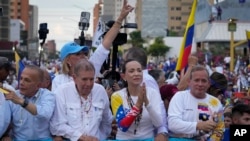Venezuelans are set to vote for their next president on July 28. Under the current leadership of President Nicolas Maduro, the country has gone through years of economic mismanagement and political turmoil, the United Nations-linked International Organization for Migration (IOM) has reported.
Some 6.1 million people left Venezuela driven by poverty and instability, many crossing the borders on foot with no idea of their destination and leaving families behind, the IOM report said.
The U.S. Congressional Research in April reported that at least 7.7 million Venezuelans fled the country amid what it described as a humanitarian crisis.
Maduro, who is seeking a third six-year term in office and is trailing in the polls, has attempted to paint the opposition as extremist.
Speaking at a campaign event in El Vigia, a town in the state of Merida, Madurocalled the opposition a force of violence.
"We are going to win in Merida and throughout Venezuela because a wave of national dignity has risen to stop fascism and the extreme right that threatens our country's peace," he said.
Days earlier, during a rally in Caracas, Maduro warned the "fascists" would plunge Venezuela into "bloodbath" and "fratricidal civil war" if he lost.
Top Maduro allies have similarly framed the opposition as "fascist far-right."
Those claims are false.
Fascism and extremism generally entail anti-democratic characteristics, including the abandonment of civil liberties, dictatorial rule, authoritarianism, far-right nationalism, forceful oppression of the opposition, hostility to political and cultural liberalism, and the pursuit of redemptive violence.
None of Maduro's relevant political opposition have reported ties with or expressed support for fascist or extremist ideologies or called for violence.
The rhetoric undermines the agreement to facilitate a competitive presidential election, Maduro's self-described socialist government and the opposition Unitary Platform coalition reached last October.
At the time, the U.S. State Department called that election roadmap a "concrete step toward resolution of Venezuela's political, economic, and humanitarian crisis."
However, analysts question whether Maduro will allow for, or accept the results of, genuinely free and fair elections. This suspicion is based on his reported misuse of administrative sources to ensure victory in the previous 2018 presidential poll, which Venezuelan neighbors, Western democracies, and rights organizations broadly viewed as illegitimate.
Ahead of the July 28 voting, the Madura-controlled Supreme Court barred popular opposition leader Maria Corina Machado from running, and authorities have arrested at least eight people connected to the opposition.
Machado describes herself as a "liberal," while her policies align with the center-right or right wing in Western democracies.
The Spanish newspaper El Pais likened her "vision of government" to that of former U.S. President Ronald Reagan and British Prime Minister Margaret Thatcher.
Machado supports a reduction of the social safety net, promotion of the free market as a generator of wealth, and a reduction of the state's control over public life.
She has advocated for reforms that would allow for the use of private health insurance, albeit with universal coverage; a social security system with the option of paying into individual accounts; and privatizing Venezuela's deeply corrupt and poorly managed state-run oil sector.
El Pais described Machado as having "a tolerant and flexible stance" on issues such as abortion, which is criminalized in Venezuela, gay marriage, and legalized marijuana.
Machado seeks for Venezuela to become a "reliable ally of Western liberal democracies," in contrast to Maduro and his predecessor Hugo Chavez, who developed strong ties with China, Cuba, Iran, and Russia.
Machado has also expressed support for Israel and called for Jews, whom she said were "forced to leave our country" due to economic instability to return.
Venezuelan authorities also prevented a Machado stand-in for the Vente Venezuela party, Corina Yoris, from registering her candidacy.
Maduro's leading challenger, former diplomat Edmundo Gonzalez, took up the mantle to run for the Democratic Unitary Platform after the court banned Machado and Yoris.
In an interview with El Pais, Gonzalez described himself as a "democrat, a moderate person, far from extreme positions" who is seeking the "democratic reconstruction of Venezuela."
Gonzalez suggested he would give amnesty to Maduro allies and supporters to "reconcile the country" and "mitigate the spirit of conflict."
Gonzalez also indicated he would follow Machado's platform. He said millions of Venezuelans voted for her in an opposition-organized primary last October, giving Machado a "mandate."
Maduro's predecessor, the late Hugo Chavez, also called Machado's Vente Venezuela Party "a far-right fascist party."
Vente Venezuela says it seeks to build up civil society and pursue free-market reforms that will end the country's "totalitarian cycles" and better citizens' lives.






